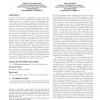Free Online Productivity Tools
i2Speak
i2Symbol
i2OCR
iTex2Img
iWeb2Print
iWeb2Shot
i2Type
iPdf2Split
iPdf2Merge
i2Bopomofo
i2Arabic
i2Style
i2Image
i2PDF
iLatex2Rtf
Sci2ools
MIDDLEWARE
2007
Springer
2007
Springer
Fair access to scarce resources in ad-hoc grids using an economic-based approach
In ad-hoc Grids where the availability of resources and tasks changes over the time, distributing the tasks among the scarce resources in a balanced way is a challenging task. In this paper, we present how using an economic-based approach, the tasks can be distributed evenly among the scarce resources. Such that all nodes which have tasks to be executed, receive more or less equal utilization from the Grid resources. We consider a continuous double auction protocol as the economic approach to share idle cpu cycles among the nodes in a local ad-hoc Grid. Each node is given a limited budget when joining the Grid. The node can use it to buy required resources or increases its budget by selling idle resources. Consumers and producers of resources determine their bid and ask prices using a dynamic pricing strategy and the auctioneer adopts a discriminatory pricing policy which sets the transaction price individually for each matched buyer-seller pair. We experiment in a network where the r...
| Added | 08 Jun 2010 |
| Updated | 08 Jun 2010 |
| Type | Conference |
| Year | 2007 |
| Where | MIDDLEWARE |
| Authors | Behnaz Pourebrahimi, Koen Bertels |
Comments (0)

